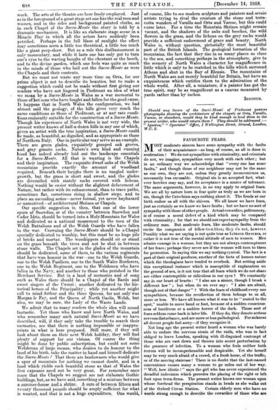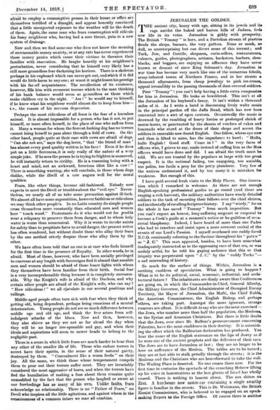FAVOURITE FEARS.
MOST moderate sinners have some sympathy with the faults of their acquaintance—so long, of course, as all is done in moderation ! We do not sympathize with criminality, and criminals do not, we imagine, sympathize very much with each other ; but in an ordinary way we acknowledge that "every one has some faults," and though those of our neighbour may not be the same as our own, they are not, unless they greatly inconvenience us, necessarily less excusable. Original sin is an accepted fact, what- ever heretics may say, and its acceptance is a source of tolerance. The same arguments, however, in no way apply to original fears. We are all by nature born in fear quite as truly as we are born in sin, though the Catechism says nothing about it. The fiends at our birth endow us all with the shivers. We all know we have fears, just as certainly as we know we have faults ; but we have no sort of sympathy with those of other people. Actual cowardice, poltroonery, is of course a moral defect of a kind which may be compared with criminality; for that we should not expect sympathy from the ordinary man. But moderate fears, like moderate faults, should excite the compassicn of fellow-tr( n.blcrs; 11.1y eo net, hcwevEr. Possibly what we are saying is not quite true as Lc twccn the KIM 01 rather it is not true of the mental attitude of men to women. Men admire courage in a woman, but they are not always contemptuous of her fears; perhaps they never are if the woman will turn to them for protection. In saying this we say nothing cynical. The fact is a part of their original goodness, another of the facts of human nature which the theologians have tended to overlook. But setting aside this exceptional instance which is susceptible of explanation on the ground of sex, is it not true that all fears which we do not share are either contemptible or ridiculous in our eyes ? We constantly say in our heart of hearts : "I also am a sinner, though I break a different law " ; but when do we ever say : "I also am afraid, though not of that danger " ? With the fears of childhood every one sympathizes, because the recollection of them belongs to us all, more or less. We have all known what it was to be "rooted to the soot," unable to move hand or foot, because of a sudden conscious- ness of loneliness or a sudden horror of the dark. Those sort of fears seldom come back in later life. If they do, they denote serious nervous disturbance, and are more or less pathologicaL For sickness all decent people feel sorry—if they recognize it.
Not long ago the present writer heard a woman who was barely able to endure the nervous strain of the raids, who was in fact obliged to leave London, speaking with ill-disguised contempt of those who are cast down and thrown into secret perturbation by the presence of infection. To a woman who feels neither both terrors will be incomprehensible and despicable. Yet she herself may be very much afraid of a crowd, of a fresh horse, of the traffic, or of the moving staircase ! There is no doubt that the last-named convenience causes many a woman to go miles out of her way. "Well, how idiotic ! " says the girl who has never experienced the dreadful indecision which precedes the placing of the right or left foot upon terra-firma. The present writer knows one woman upon whose forehead the perspiration stands in beads as she walks out of the Oxford Circus Station. Certain elderly men who have no words strong enough to describe the cowardice of those who are
afraid to employ a consumptive person in their house or office are themselves terrified of a draught and appear honestly convinced that a little unexpected exposure to the weather will be the death of them. Again, the same man who fears consumption will ridicule his fussy neighbour who, having had a sore throat, puts in a new system of drainage.
Now and then we find some one who does not know the meaning of unreasonable money anxiety, or at any rate has never experienced those money panics which cause their victims to threaten their families with starvation. He laughs heartily at his neighbour's perturbation, never considering that he himself very likely has a still more groundless fear darkening his horizon. There is a skeleton perhaps in his cupboard which can never get out, and which if it did would do little harm to anyone; at worst it might lessen his prestige with his far-off acquaintance. The recollection of its existence, however, fills him with recurrent terrors which to the man thinking of his bank balance would seem as greundless as those which make children cry in the night. " Ass ! " he would say to himself, if he knew what his neighbour would almost die to keep from him- i.e., the reason of his nervous depression.
'Perhaps the most ridiculous of all fears is the fear of a harmless animal. It is almost impossible for a person who has it not, to put himself, or more often herself, in the place of one who suffers from it. Many a woman for whom the fiercest-looking dog has no terrors cannot bring herself to pass alone through a field of cows. On the other hand, people quite at their ease with cows are afraid of dogs. "Can she not see," says the dog-lover, "that the friend of man' has almost every good quality written in his face ! Evan if he does put on a little fierceness, it is only really of the nature of a ',cry simple joke. If he sees the person he is trying to frighten is unmoved, he will instantly return to civility. He is a reasoning being with a heart and mind, not an awkward, ferocious idiot like a cow ! " There is something wanting, she will conclude, in those whom dogs dislike, while the illwill of a cow augurs well for the moral qualities.
Fears, like other things, become old-fashioned. Nobody now expects to meet the Devil or troubles about the "evil eye." Never- theless, we nearly all of us take some precaution against ill-luck. We almost all have some superstition, however faithless or ridiculous we may think other people's. In no Latin country do simple people cross themselves more constantly than educated men and women here "touch wood." Protestants do it who would not for Forlds wear a reliquary to preserve them from danger, and to whoin holy water is worse than nonsensical. Why it is worse to invoke saints for safety than to propitiate fates to avoid danger, the present writer has often wondered, but without doubt those who allay their fears by the one method utterly despise those who allay them by the other.
We have often been told that no one is at ease who finds himself for the first time in the presence of Royalty. In other words, he is afraid. Most of those, however, who have been socially privileged to converse at any length with Sovereigns find it absurd that sensible men and women should be afraid of those lesser lights with whom they themselves have been familiar from their birth. Social fear is a very incomprehensible thing because it is completely unreason- able. Why the Knight's wife is afraid of the Duchess, and why certain other people are afraid of the Knight's wife, who can say ? "How ridiculous ! " we all ejaculate in our several positions and callings.
Middle-aged people often turn sick with fear when they think of getting old, being dependent, perhaps being conscious of a mental deterioration. Young people do not see so much difference between middle age and old age, and think the fear arises from self- indulgent attacks of the blues. Now and than, however, they also shiver as they see not so far ahead the day when they will be no longer irre-sponsible and gay, and when their ideals and aspirations will seem to newer heads to belong to the negligible past.
There is a sense in which little fears are much harder to bear than
any other of the smaller ills of life. Those who endure terrors in secret have their spirits, in the sense of their natural gaiety, destroyed by them. "Concealment like a worm feeds" on their joy. All the same, we think those whose temperament compels them to pour out their terrors suffer most. They are invariably considered the most aggressive of bores, and when the terrors have fled the humiliation of making a fuss about them remains quite unmodified by the fact that the person who laughed or swore at our forebodings his as many of his own. Unlike faults, fears acknowledge no relationship. There is no "Father of Fears," no Devil who inspires all the little agitations, and against whom in the consciousness of a common injury we mav all combine.







































 Previous page
Previous page